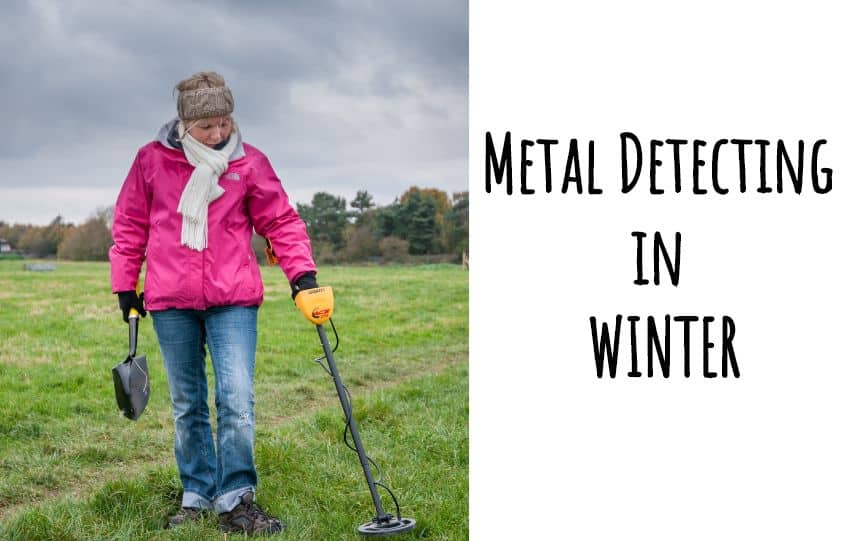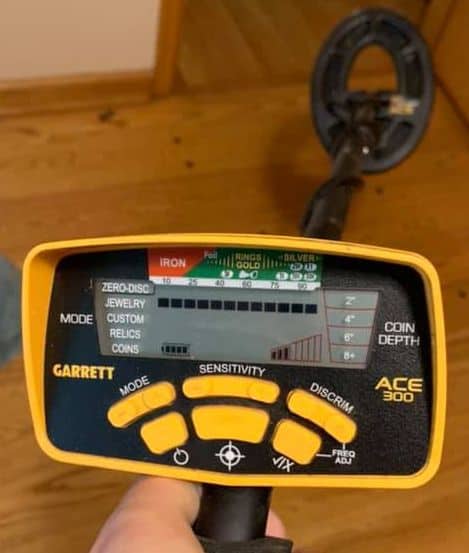
… In fact, I don’t agree with those who give up on the hobby during this season … In fact, I absolutely see no reason why you should make such a decision! There is a ton of good reasons to double down swinging your beloved detector during winter…
… However, there are still few things you need to take into consideration before you go out! This Post breakdown all the details you actually need to know.
Why you should consider this hobby in wintertime?
For hardcore detectorists won’t wait for spring until the weather turns favorable to go hunt outside. This is especially true if you have gotten some new detecting equipment during the end of the year!
There is no doubt, though, that this season could be challenging for an outdoor hobby like metal detecting. There are some regions that tend to get bitter cold during and hobbyists in these areas would definitely need some extra equipment for more efficiency.
Since wintertime is typically considered to be an off-season for most detectorists, this simply means that it is a great time to search for potential areas without a crowd or other competing hobbyists in the same locations.
Another good reason to go is the fact that generally extreme weather is the most likely condition when you find long lost valuable items …
… Indeed, people indulge in many winter activities such as ice fishing, ice hockey, ice skating, and sledding, which are just right to end up losing many things. This provides you with the perfect opportunity to find some valuables, even in the cold weather. (I still suggest returning lost items to the owner as an ethical act)
Places where you should metal detect in winter?
There are several places that you can target during this season:
1. Unfrozen Bodies of Water
If there are water bodies around you that are no frozen, then you can think of detecting here in the winters.
Detectorists who have underwater detectors have actually discovered some wonderful targets in the shallow water’s edge in the winters.
There is also a lot less amount of trash to dig when you are searching in water. Make sure to put on some insulated waders or a wetsuit to stay warm.
2. Shoreline and Beaches
The shoreline and saltwater beaches can be great places too! Even when there is snow in the surrounding areas, the water and wind keep the shoreline and beaches snow-free.
Furthermore, sand does not generally freeze above the high tide lines. Additionally, if there is a little bit of sun, these areas remain suitable for digging.
3. Winter Hotspots
Even though the ground may be frozen, you can still look for treasure in the snow!
Spots that serve as gathering places for people, such as sledding hills, ice skating and hockey rinks, fishing ponds, and other winter sport places, can lead you to find valuable stuff for sure.
If you happen to be near a ski resort, you will be surprised to see the amount of stuff people keep dropping. The removal of gloves in the winters often dislodges rings that then become covered in snow, thought to be lost forever. (Don’t forget to return lost stuff to the owner)
4. Thick Woods
Thick woods can have grounds that are not quite as frozen as expected during the winter!
This is because thick woods are insulated from the chilly winds. Also, head towards higher ground as opposed to low-lying grounds.
Woods, located at the higher ground, have a lesser amount of moisture that manages to settle down into hard layers. This is because higher grounds have more exposure to sunlight.
What Detector should you use in this case?
In such a case, you should opt for having a waterproof/ weatherproof detector, and preferably has a backlight as it tends to get dark quite early in the winter days …
… For this I have 3 model suggestions for you.
Fisher F22 (Check it Here at Amazon) is an excellent waterproof model that you can consider. It has a fast return speed and is capable of identifying buried targets with the help of Target ID of 0-99, a nine segment target categories, and many other customized features.

Garrett ACE 300 (Check it Here at Amazon) is a very popular model. It is weatherproof and will serve pretty well to detect across different environments. Does a great job when it comes to relic/jewelry hunting, coins shooting, and you can rely on it for dry beach and freshwater hunting. Also, the operating frequency (8 kHz) provides better sensitivity on low and medium conductivity targets such as gold.
Fisher F44 (Check it Here at Amazon) is probably the best entry model in my humble opinion, very easy to use. It comes with a backlight, making it easier for you to stay outside even in after it gets dark. It is also a weatherproof model that brings both automatic and manual ground balance, five search modes, adjustable iron audio, and a weatherproof control box that you can rely on during winter.
Additional Tools you will need to detect during cold weather
You are definitely going to need some additional accessories when you want to detect in the winter. These include:
- Gloves to protect your hands (Check this Gloves List)
- Knee pads (Check this Knee Pads List) to protect your knees and keep them warm, especially when you have to kneel in the snow.
- Hats (Check this Hats List) to protect your head against the cold wind.
- Comfortable boots (Check this Boots List) for long hours of walking around in the snow.
You will also need to keep a jackhammer with you to dig in the snow and hard-packed icy soil. Remember to keep as much of your skin covered as you possibly can.
Lastly, I highly invite you to learn the best way to dress for metal detecting!
Tips on beach detection in wintertime
Detecting activities in the beach in this season can prove to be very lucrative! This is because of the many winter storms that come in …
… Furthermore, the wind patterns also create many disruptions on the coastline, making your job easier. Hurricanes and high winds uncover many types of treasures that you can easily find.
The beach is one of the best places to find gold, silver, jewelry, and even gemstones in the winter because the beach is unlikely to freeze over completely.
What is essential to remember while detecting on a cold wintery day at the beach is to dress warmly and wear good shoes. This will come in handy when you are detecting in low tides.
When at the beach, try to search in places where the sand has been washed away and where a new layer of rocks has become exposed after a winter storm.
Tips for metal detecting in snow!
It is very much possible to use your detector in snow! However, detecting the ground covered by snow is not an easy task.
If the ground is frozen, then digging will turn to be a heavier task to accomplish! You may need to have a shovel with a footpad step to make digging easier.
Furthermore, there are many models of detectors that come with LCD screens, and the cold weather may damage such a screen.
Also, your batteries tend to discharge faster when you are working in cold conditions. So keep the batteries inside a jacket pocket or a thermal bag, or even inside your car until you need to use them.
When detecting in the snow, you will need to add several more items to your detecting toolbox. These include:
- Rake: For removing snow every time you think you have found something.
- Lighter: Digging can be very hard when there is a lot of snow around. In such cases, a lighter can be really useful for melting some of the snow.
- Gloves to make sure your hands don’t freeze.
How to deal with your detector depth in snow?
When you are searching in the snow, you will face certain issues with regards to the depth at which you can dig for targets.
You will not be able to go down as deep as you are used to in the summer months because of the layers of snow.
The maximum depth to which you can go down also depends on the thickness of the snow and on the condition of the snow – whether it is packed or aerated.
For more information, I invite you to check this metal detector depth guide! You will get more insight …
Pay attention to these things during winter…
You will need to take several precautions! Dressing warmly is extremely important while spending hours outdoors in the cold to freezing temperatures. Also, make sure to cover as much of your skin as there is a real risk of frostbite in the winters.
You also need to watch out! There is a massive risk of slipping and falling on ice, and if you land or drop on your detector, then that can also get damaged. You can also seriously hurt yourself if you fall on your head or back.
There are many areas around the world where winter is known to be the hunting season! So if you are going metal detecting in wooded areas where it might be difficult to spot you, then make sure that you wear brightly colored clothing so that you are not mistaken for an animal, and you are not hurt.
Be careful when you are detecting over frozen water bodies as it becomes difficult to judge where the ice may be thin. So don’t risk searching in places where the ice might break, causing you to go under the water.
Cases where you should not detect in winter …
When it becomes just too cold or freezing to bring yourself to go outside and detect, then there are still many ways in which you can indulge yourself in your hobby!
However, Do not go out of the house if temperatures fall beyond a certain point or if the local authorities declare unfit temperatures.
In such freezing cold conditions, it is a better use of your time to start researching places to hunt once the weather gets a bit warmer!
The most successful detectorists are the ones who research their potential spots properly before heading out into the field. They search for well-traveled spots, or where events have taken place in the past. Information on these types of areas can easily be located at the local library or the local historical society.
Prepare for the spring and plan the trips you want to take. Research thoroughly and be ready for the weather to break.
Conclusion
My main goal is not only to encourage you go out detecting in Winter which is something you should absolutely try! But also, my aim was to educate you, as much as possible, about what it takes to be successful doing so…
… I also don’t want you to take too much unnecessary risks if the weather is just too bad to deal with or too cold! Your safety, always, comes first…
… So, yea, go out there and have some fun!
Finally, don’t forget to check my favourite times to go metal detecting!
